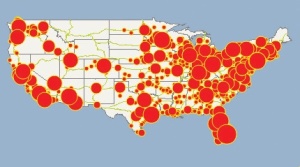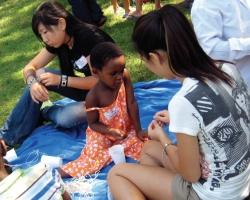Amira (not her real name) began fearing for her family’s life after her husband was kidnapped. That fear compelled her to leave everything—her family, friends and comfortable life in Baghdad—and flee to Jordan.
In Jordan, Amira and her sons applied for resettlement with the United Nations High Commission for Refugees (UNHCR), the organization charged with the protection of refugees—people forced to flee their countries because of persecution based on race, religion, nationality, political opinion or membership in a particular social group.
Eventually, Amira’s family was invited to resettle permanently in the United States. They did so with the help of World Relief, a resettlement agency that found Amira’s family a modest two-bedroom apartment, connected them with government and state aid, and helped Amira’s sons secure jobs as meat packers.
While they work, Amira attends English classes and constantly wonders if her husband is dead or alive.
The Flood of Refugees
When Amira’s family arrived in 2008, they were just three of the 60,192 refugees admitted to America that year, three of the nearly 5 million people displaced by violence in Iraq since 2003 and three of the nearly 15.2 million refugees worldwide. Besides Iraq, most refugees resettling in America today are from Bhutan and Burma, where a 20-year ethnic cleansing has forced nearly 100,000 Bhutanese and 250,000 Burmese to flee to refugee camps, which are established to contain the refugees who otherwise are flooding into neighboring countries.
Once at a camp, refugees cannot leave until they’re invited to return to their homeland or resettle elsewhere, which less than 1 percent are allowed to do. For those contained in refugee camps, life is on hold as they try to survive in makeshift shelters with scarce food, medical care and jobs.
For those refugees fortunate enough to resettle in another place, life remains challenging. Many refugees find it difficult to become self-sufficient and adapt to a new culture and language or begin working in a job that bears little resemblance to what they did in their home country. As one refugee said, “We’ve been waiting at the starting block for years. Now we can go. We just don’t know how to go.”
That’s why refugees need people to walk alongside them, to teach them how to go. Who better to do this than the Christians who worship Jesus, a refugee forced to flee to Egypt as a toddler to avoid being killed by King Herod?
We are, after all, a church called to “be hospitable to one another without grumbling” and “to look after orphans and widows in their distress” (
Through refugee ministry, we can fulfill these biblical mandates by ministering to the 60,000 to 80,000 refugees who are resettled each year in our communities, in nearly every state, without the expense of travel. We also can engage youth in longterm, multi-generational mission opportunities with their families and church communities that eventually become integrated into their daily lives.
Youth Can Turn the Tide
“The world is at our doorstep!” Jenna Liao, Volunteer Mobilization Coordinator at World Relief—DuPage, said. “It’s an incredible thing when these mission opportunities are right here, when it’s literally your neighbor you get to serve.”
Refugee ministry enables youth to grow in their understanding of and appreciation for other cultures and to learn how to relate to those who are different from them. Doing so challenges youth to see life from another perspective.
“We are all made in God’s image, so we all image God in a different way,” says Julie Carlsen, Partnership Director at Exodus World Services, a ministry that educates local churches about refugee ministry. “As we get to know other cultures, our own faith grows and expands as we see different parts of God’s character.”
When youth befriend a family of six refugees who arrive with everything they own in two suitcases, it becomes difficult for them to despair about not having the things they want. Such ministry counteracts the messages of materialism that youth are inundated with and emphasizes what’s actually at the heart of our faith—relationships.
“What refugees miss most are their families and friends,” Carlsen said. “I delivered some items to a refugee family from Ethiopia. They immediately served tea to us, offering us hospitality. This simple act reminded me that relationships are paramount to our faith. The ministry of presence that we offer refugees and that they show us is a reflection of what God offers us in our relationship with Him.”
Ministry to refugees also provides youth with opportunities to use their gifts to serve others. Because youth have grown up in the United States, they’re experts in the language, stores and the systems that so often confuse refugees. By patiently explaining the difference between shampoo and conditioner or how to vacuum, youth can assist refugees in acclimating to life in America.
Though refugee ministry initially can be intimidating because of language and cultural barriers, it doesn’t have to be. To help make refugee ministry more accessible to youth, consider the following:
• Find out if there are refugees in your state by consulting the Office of Refugee Resettlement at acf.hhs.gov/programs/orr/data/refugee_arrival_data.htm.
• Build bridges with resettlement agencies in your area to find out how best to meet the needs of local refugees. If you’re unsure which agencies are in your community, contact Exodus World Service at e-w-s.org.
• Encourage youth to befriend refugee and immigrant kids at their schools and invite them to youth ministry events. Meet their families and ask how you best can meet their needs.
• Educate youth about refugees’ plight. Show movies such as God Grew Tired of Us and The Lost Boys of Sudan, or read and discuss books such as Beetles and Refugees: A Boy’s Remarkable Journey from a Refugee Camp to Harvard or The Story of My Life: An Afghan Girl on the Other Side of the Sky.
• Host a simulation to help youth see refugees as individuals and begin to identify with them. To obtain information about a simulation that can be modified for your setting, contact Exodus World Service.
• As a church, celebrate World Refugee Sunday, the Sunday closest to June 20. Share stories and music from refugees and pray for them.
• Begin serving refugees in short-term, group settings. Collect various items that refugees need—pots and pans, food staples, toiletries and cleaning supplies—and deliver them to a refugee family when they arrive. Talk with the family and teach them how to use items they may be unfamiliar with.
• Host events for refugee children such as Christmas parties or soccer tournaments.
• Begin after-school programs for refugee children who are often behind in school.
Have youth provide one-on-one tutoring for the children or speak to your church leadership about allowing a resettlement agency to teach English classes in your facility.
• Divide interested youth into small groups and pair each with a refugee family to mentor weekly for three to six months. Use this time to share stories, answer questions, practice speaking English, go shopping together and play games.
Regardless of how you minister to refugees, teach your youth to spot God in each other and the refugees they befriend, and then watch as they discover more about who they and God are. In the process, don’t be surprised if they begin living missionally in their very own communities.
Where Are the Refugees?
Government agencies worked together to plot settlement patterns of refugees in the United Sates. Click here for more about this map.
Photo submitted by author from an event called “Fun in the Sun” for refugees hosted by Lakeview Student Ministry in August 2007. More than 80 refugees from Burma and many African countries were served that day.




